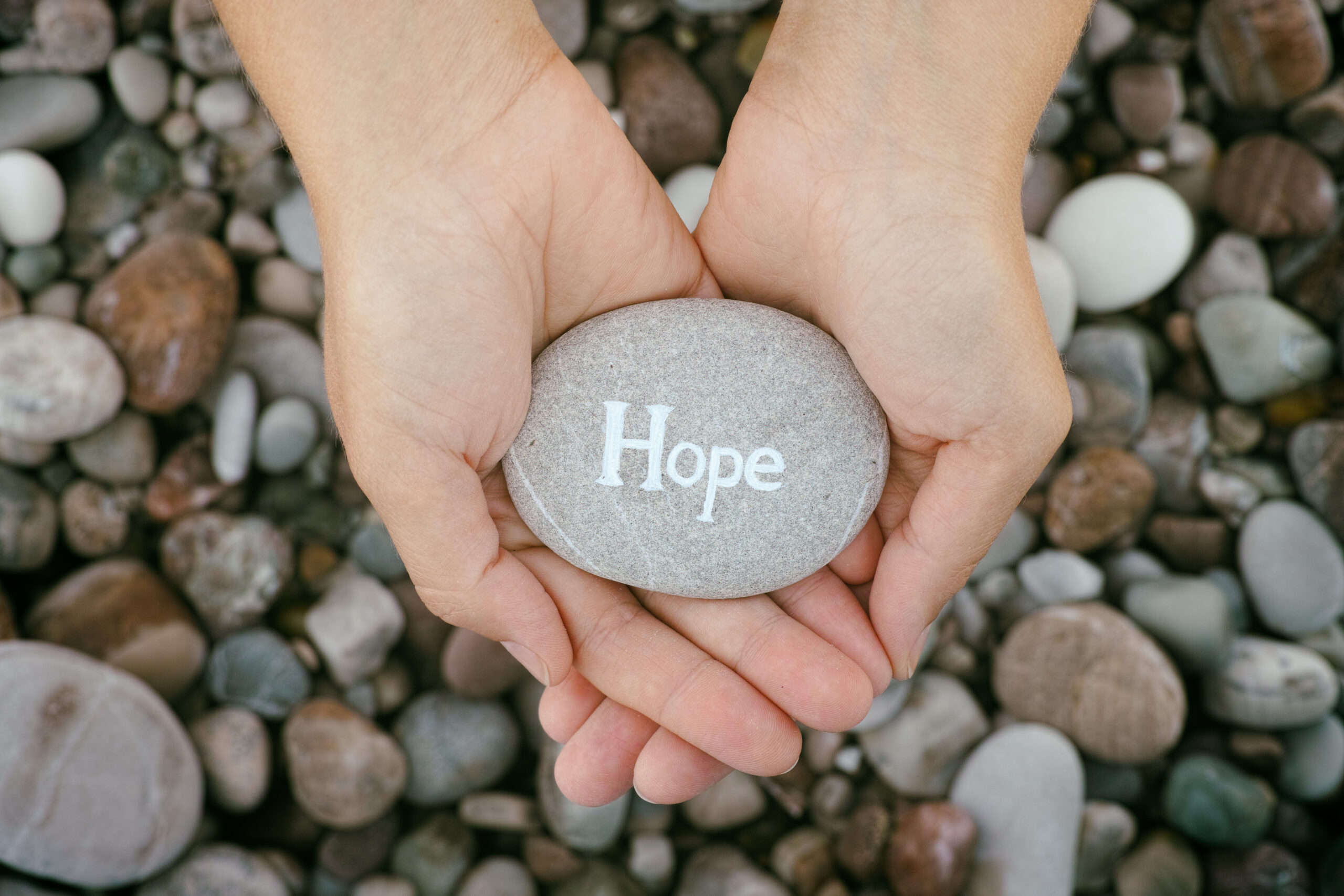🌻 Is Your Cup Half Full or Half Empty?
“Hope does not deny all the difficulty and danger that exists, but it is also not stopped by them.”
– Jane Goodall
During trying times, you may feel that your positive energies are dwindling – your cup may seem more empty than full. I know I have felt this way. How about you?
When your cup feels diminished, how do you refill it? This article offers two strategies: (1) Hope – a pitcher you can pour from to help refill your cup, and (2) Reclaiming time and space in your life to renew and reinvigorate yourself.
Let’s begin with hope.
According to psychologists, hope is one of the 24-character strengths common to humankind, offering meaning and helping us connect to the world around us (Niemiec, 2014).
Hope is composed of strategies, tools you can learn about and use in your day-to-day life. During difficult, uncertain or overwhelming times, hope strategies can help you notice that behind the shadows, there is light. Recently, I wanted to adjust a cabinet in the kitchen of my home. I searched for the flat-head screwdriver and thought my husband must have misplaced it. Then I spotted a corner of the elusive screwdriver’s black and yellow handle, hanging where it always is, but it was obscured by his baseball hat. Sighing loudly with frustration, I looked more carefully, and saw the screwdriver was actually there all the time, but I hadn’t noticed it. Looking more carefully at our lives, we can discover greater hope.
Ultimately, experiencing our cup as half full or half empty involves tactics we can choose. It is within our power to rally hope and call it forth – even during trying times. In The Book of Hope (2021), anthropologist Jane Goodall, PhD, writes: “When we face adversity, it is hope that gives us the confidence to rally our indomitable spirit to overcome it.”
Put another way, when we can see in the light of our mind or heart, a pathway to a future that is better than the present, this is hope. During difficult times, hope may involve seeking a middle ground, where both the current truths and our desire for a better future can co-exist (Groopman, 2005).
Empirical evidence consistently shows that hope and optimism benefit our emotional and physical well-being, positive relationships, and effectiveness in athletics and academics (Rand & Cheavens, 2009; Snyder, 2002; Schiavon, et al, 2017). Hope is a choice we can make and actions we can take, even during trying times.
Hope theory posits that we can generate the capacities, pathways, and resolve to reach toward our goals (Snyder, Rand, Sigmond, 2002; Snyder, 2000). Hope theory shifts hope from wishful thinking to doing with intentional goal-oriented motivation and action (Feldman & Dreher, 2012). Hope theory outlines three components: (1) Having a goal; (2) Agency, the motivation and determination that your goal can be achieved; and (3) Pathways, a plan for reaching your goal.

Now let’s turn to ways to refill your own cup by reclaiming time to reinvigorate yourself. If one of your goals is to take some time for yourself, how can you carve out some minutes each day that are just for you? There’s an expression that I believe is attributed to Steven Covey – When we say yes to something, we’re saying no to something else.
What can you say no to, so you can say yes to you? For the purposes of this discussion, let’s say that saying yes to ourselves is simply good self-care. To reclaim time and space for yourself, you might experiment with saying yes to yourself, by carving out precious moments that help you create space once or twice a day to reset and restore.
🌈 Examples of ways to generate restorative moments:
- Listen to sounds or music that bring you peace.
- Surround yourself with a soft scarf, blanket, sweatshirt, or sweater.
- Look at art you enjoy.
- Rest in prayer, mindfulness, or connection with something or a power larger than yourself.
- Watch a humorous video; think of a funny story or personal experience.
- Set your table or desk with flowers or other beauty that brightens your moments.
- Post a quote or poem on your wall that brings you peace, and notice it during the day.
- Pause and notice your in-breath and out-breath.
- Light a candle or sit in soft lighting.
- Take a walk with awareness, noticing your surroundings or how the movement feels.
- Read a poem or a book.
- Journal about your hopes, thoughts, ideas, whims.
- View water outdoors or an image of watery spaces.
Is your cup half full or half empty? How will you refill your cup when you want or need to?
You can access more ideas for restorative moments here:
Disclaimer: This article is for informational purposes only. No content is a substitute for consulting with a qualified mental health or healthcare professional.
© 2024 Ilene Berns-Zare, LLC, All Rights Reserved
Send your comments and suggestions to Ilene!
Click here to send Ilene an email with your thoughts about this blog post.
References:
- Feldman, D.B. & Dreher, D. (2012). Can hope be changed in 90 minutes? Testing the efficacy of a single-session goal-pursuit intervention for college students. Journal of Happiness Studies, 13, 45-59.
- Goodall, J., & Abrams, D. (2021). The book of hope: A survival guide for trying times. New York, NY: Celadon Books.
- Groopman, J. (2005). The anatomy of hope: How people prevail in the face of illness. New York, NY: Random House Trade Paperbacks.
- Niemiec, R.M. (2014). Mindfulness & character strengths: A practical guide to flourishing. Boston, MA: Hogrefe.
- Rand, K.L. & J.S. Cheavens. (2009). Hope theory. In S.J. Lopez & C.R. Snyder (Eds.) The Oxford Handbook of Positive Psychology, 2, (323-333). New York, NY: Oxford University Press.
- Snyder, C. R. (2002). Hope theory: Rainbows in the mind. Psychological Inquiry, 13, 249-275.
- Schiavon, C. C., Marchetti, E., Gurgel, L. G., Busnello, F. M., & Reppold, C. T. (2017). Optimism and hope in chronic disease: a systematic review. Frontiers in psychology, 7, 2022.
- Snyder, C.R., Rand, K.L. & Sigmon, D.R. (2002). Hope theory: A member of the positive psychology family. In C.R. Snyder & S. Lopez (Eds.), Handbook of Positive Psychology (257-275). New York, NY: Oxford Press.
Ilene is a Featured Author on PsychologyToday!
Read her blog series Flourish and Thrive: Navigating transitions with mindfulness and resilience.

How do you choose to refill your cup?
Tap into your strengths, purpose, and potential to flourish in life and work.
If you’d like to discuss how Ilene Berns-Zare Coaching can help you achieve your goals, contact Ilene.
Coaching with Ilene Can Help You Call Yourself to Action
Ilene Berns-Zare, PsyD, PCC, CEC, is an Executive and Personal Coach and Speaker. Ilene helps people live their best personal and professional lives by bringing mind, body, and spirit into flow with strengths, purpose, and potential. She inspires clients to find fresh perspectives and access their full potential as creative, resourceful, whole persons. Find Ilene online, set up a free discovery coaching consultation, and access free resources at https://ibzcoaching.com/.
Please share this blog with anyone who might be interested in reading it!
We would love to hear from you! We are interested in your suggestions for this newsletter, your reactions to this one, or providing more information about coaching.



